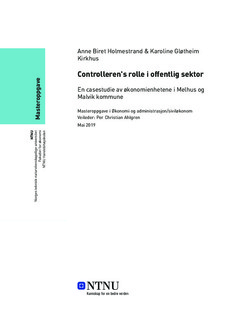| dc.contributor.advisor | Per Christian Ahlgren | |
| dc.contributor.author | Holmestrand, Anne Biret | |
| dc.contributor.author | Kirkhus, Karoline Gløtheim | |
| dc.date.accessioned | 2019-09-17T14:00:46Z | |
| dc.date.available | 2019-09-17T14:00:46Z | |
| dc.date.issued | 2019 | |
| dc.identifier.uri | http://hdl.handle.net/11250/2617273 | |
| dc.description.abstract | Gjennom den siste tiden har det skjedd en rekke endringer innen økonomistyring i offentlig sektor. Flere trekker disse endringene opp mot den nye internasjonale trenden New Public Management, som har økt fokuset på økonomistyringen i offentlig sektor ved å effektivisere styringen ved hjelp av styringsprinsipper fra privat sektor. Dette har ført til en ny kontekst for controllerne i kommunal sektor. Litteraturen og tidligere studier beskriver en utvikling fra en tradisjonell controllerrolle preget av oppgaver som rapportering, til en moderne controllerrolle der oppgaver preges av en mer rådgivende tilnærming.
Formålet med denne studien er å få bedre innsikt i controllerens rolle i mellomstore kommuner. Dette undersøkes gjennom følgende problemstilling: «Hvilken rolle har controllere i mellomstore kommuner i Norge, og hvordan er økonomifunksjonen organisert?». For å belyse problemstillingen har vi valgt å gjennomføre to kvalitative casestudier i henholdsvis Melhus og Malvik kommune. For å samle inn data har vi fokusert på dybdeintervju og åpne intervju samt dokumentstudier. Studien har til hensikt å bidra med kunnskap om hvordan dagens controllerrolle ser ut, og hvorvidt den samsvarer med utviklingen av controllerrollen som beskrives i litteraturen. I studien har vi gjennomført dybdeintervju av fem controllere i de to kommunene, samt åpne intervjuer med to av deres nærmeste ledere. Problemstillingen er drøftet opp mot det teoretiske rammeverket, hvor et institusjonelt perspektiv og tidligere litteratur står sentralt.
Studiens mest sentrale funn viser at praksisen i mellomstore kommuner stemmer overens med litteraturens fremstilling av controllerens rolle, da rollen er hybrid og kompleks samt preges av tradisjonelle oppgaver supplert med moderne oppgaver. Organiseringen i kommunen påvirker rollen og samhandling på tvers av organisasjonen blir stadig viktigere. Denne dynamiske forflytningen mellom ulike roller samt forskjeller på hver enkelt controller gjør det vanskelig å definere en entydig rolle. Samtidig ser vi at controllerne ønsker mer tid til den rådgivende rollen og at ulike faktorer former rollen, da både personlige faktorer og institusjonelle faktorer. | |
| dc.description.abstract | Recently, a number of changes have taken place in accounting management in the public sector. Several draw these changes against the new international trend New Public Management, which has increased the focus on accounting management in the public sector by streamlining management by using management principles from the private sector. This has led to a new context for the controllers in the municipal sector. The literature and previous studies describe a development from a traditional controller role characterized by tasks such as reporting, to a modern controller role in which tasks are characterized by a more advisory approach.
The purpose of this study is to gain a better insight into the role of the controller in medium-sized municipalities. This is investigated through the following issue: «What role do controllers in medium-sized municipalities in Norway have, and how is the finance function organized?». To elucidate the issue, we have chosen to carry out two qualitative case studies in Melhus and Malvik municipality, respectively. In order to collect data, we have focused on in-depth interviews and open interviews as well as document studies. The study aims to provide knowledge about how the current controller role looks and whether it matches the development of the controller role described in the literature. In the study, we conducted in-depth interviews of five controllers in the two municipalities, as well as open interviews with two of their closest managers. The issue is discussed against the theoretical framework, where an institutional perspective and previous literature are central.
The study's most important finding shows that the practice in medium-sized municipalities is consistent with the literature's role in the role of the controller, as the role is hybrid and complex, and is characterized by traditional tasks supplemented by modern tasks. The organization in the municipality affects the role, and interaction across the organization is becoming increasingly important. This dynamic shift between different roles as well as differences on each controller makes it difficult to define a unique role. At the same time, we see that the controllers want more time for the advisory role and that different factors shape the role, both personal and institutional factors. | |
| dc.language | | |
| dc.publisher | NTNU | |
| dc.title | Controlleren's rolle i offentlig sektor | |
| dc.type | Master thesis | |
